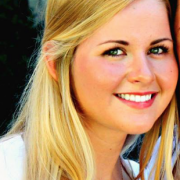New Early Childhood Teacher Feels Prepared for the Profession

Nicole MacIntyre graduated from the University of Maryland College Park in May 2015 with a degree in Early Childhood Education. The University of Maryland College Park is one of ten institutions in the state of Maryland with baccalaureate and graduate degree programs that have earned NAEYC National Recognition by providing evidence that they provide students with learning opportunities that align with the NAEYC Early Childhood Professional Preparation Standards.
This fall, Nicole is working as a literacy teacher at a preschool in southern California. Fellow University of Maryland student and NAEYC summer intern Caroline Cummings asked Nicole a few questions about how she got to where she is now, how college prepared her for the profession, and what she hopes her classroom will be like.
What made you interested in a career in early childhood education?
The elementary education major was more content based, while the early childhood program focused more on human development and I found that to be more interesting. A child’s early years are so critical in developing their personality, passions, interests, and skills. When children first enter school, their desire to learn is very prevalent. I believe that I can encourage their love for learning, helping to extend and sustain that passion as they grow older.
Are there specific classes that prepared you for your upcoming position?
I enjoyed a class on how to involve families in the learning process and develop positive relationships with the community and families. I worked on a family involvement project where we tracked student learning in a specific content area for a couple of weeks and got to see the difference in student learning after the lesson was implemented. Getting to see the excitement on my students faces when they came back with the work they completed with their parents was something I'll never forget. The more parents are involved in their child’s learning, the more the children benefit and this also builds trust between parents and teachers.
What was your student teaching like?
I taught full time in a kindergarten and completed multiple takeover weeks when I took over as the head teacher. Many children didn’t speak English as a first language and many were from low-income families. It was an honor to watch these children go from knowing not a word of English to being able to meet reading benchmarks by the end of the year. It also challenged me to be a better teacher. Those takeover weeks made me realize how overwhelming it can be to be responsible for a classroom all on your own. When my mentor teacher would leave, I felt the pressure that the learning and well-being of these children was all on me. I began to develop my own teaching styles and routines and grew more comfortable with the various responsibilities.
What unique experiences do you hope to bring children in classroom?
As a teacher, my number one goal is to make learning fun and engaging. I want to make learning as meaningful and relevant to my students' lives as possible. I hope to teach thematic units where I can pick topics that the children are interested in and center learning around that topic. Many people tell me that because the children I’m teaching are so young, they won't even remember me. For me, that is alright. What I hope to achieve is the personal understanding that I play a crucial role in helping set these children up for successful lives.
What kind of class or training did you have in working with children with a home language other than English?
When I worked with children who spoke English as a second language, we only instructed them in English. I had taken classes on cultural difference and integrating culture into the classroom. Although these classes were helpful in understanding the backgrounds of the students I was working with, I think it would have been beneficial for my program to have required us to take Spanish classes because so many of us work with students who speak Spanish as a primary language. We need more preparation for working with a variety of cultures and populations in the field of education.
In what ways did the mentor teacher help you?
My mentor teacher was a tremendous help during my student teaching experience. She always made a list of what she noticed I did well in and what she thought I could improve on. She maintained a good balance between giving advice and pulling back and allowing me to grow as a teacher by developing my own unique teaching style. My mentor was always open to my feedback and gave me the freedom I needed in order to become more confident in my own abilities. At the end of the year, she also gave me a flash drive with all the activities she's accumulated over the years, a helpful resource for me now that I have my own classroom!
Caroline Cummings is a Broadcast Journalism student at the University of Maryland, College Park. She worked as an intern at NAEYC during the summer of 2015.
